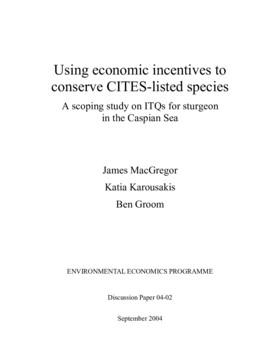Using economic incentives to conserve CITES-listed species. A scoping study on ITQs for sturgeon in the Caspian Sea

The Convention on International Trade in Endangered Species of Wild Fauna and Flora (CITES) is an agreement between governments that aims to protect the survival of wild animals and plants from illegal trade or trans-shipment of specimens within the international market. The annual value of this market is estimated at $200 billion and growing. CITES recognises that economic incentives could be used to make wildlife trade more responsible, and has begun investigating the effectiveness of the individual transferable quotas (ITQ) system. This study explores the applicability of the ITQ system on the sturgeon population in the Caspian Sea which is currently under threat and listed on CITES Appendix II. Using information from a number of case studies where ITQs have been implemented, it highlights the limitations of ITQs and indicates research necessary to design and implement a sustainable system. Findings suggest, that an integrated approach is required which incorporates economic, social, political and biological information, adequately reflecting local conditions.
Cite this publication
Available at https://www.iied.org/9448iied